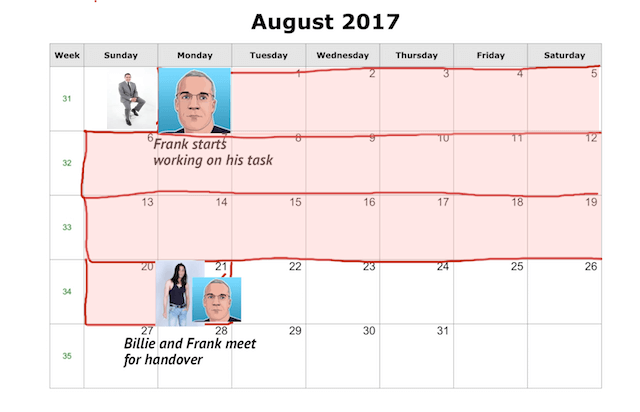Getting people to complete their work in time is one of the biggest challenges for every project manager. In this article I’ll show you a powerful strategy for creating accountability.

“People are not sticking to their timelines!” I hear this complaint all the time when speaking to first-time project leaders. Welcome to the club! What you observed isn’t just an exception.
This is just very normal, and it’s one of the reasons why we need project managers. If every person in your team would fulfill their role in the best way possible, and if deadlines were always met, we would not need project managers.
So, what can we do to get people to deliver their work in the desired quality and time?
Let me introduce you to the Sandwich Strategy.
The Sandwich Strategy
Less work you, more accountability: The Sandwich Strategy works very well when there are a lot of dependencies in a project, as it is usually the case.
You have one person having to provide input to another person, and this person may again have to provide input to somebody else (and so on).
Here’s an example:
- You are the project manager
- Frank works in sales. He has been given the task to create a concept for a new software release.
- Billy is a software developer. His job is to put Frank’s ideas into a working software.
What would happen if you just let things happen without control?
Frank might procrastinate and fail to turn in the concept on time. For you as a project manager this would mean you wouldn’t know about the delay until your next check in with Frank, by which time valuable time and resources would have been wasted.
The entire work stream would get delayed, and Billy would not be able to complete his job on time either.
What could you do to avoid this situation?
I’ll show you.
At the time you give Frank the task to create the concept, you go to Billy right away and ask him to schedule a meeting with Frank at the time he is supposed to have the concept ready:
“Hi Billy, I just asked Frank to work out the new concept for the software. It’s going to be ready in three weeks. Please schedule a meeting with Frank in 3 weeks and have Frank walk you through the concept.”

This approach is so effective for several reasons:
- It will increase the probability of Frank completing his work on time. Why? Whenever he checks his calendar, he will see the upcoming appointment with Billy, and he’ll be reminded of the important work he is supposed to do.
- The strategy makes use of the human drive to avoid embarrassment. We don’t want to look like lazy bummers in front of others.
- You don’t have to check in with Frank, because anyway Billie is going to meet Frank and find out whether work has been done.
I call it Sandwich Strategy because our colleague (Frank in this example) is getting approached from two sides. From me as a project manager assigning work, and from Billie the developer who depends on Frank’s work.
We are not trying to be mean here. This is just a smart way to create accountability.
Now, here’s a question to you: Taking the example above, why would I not ask Frank to schedule the meeting?
It’s because this would leave all the control to him, and he could simply decide not to meet with Billie if he finds himself not being able to deliver on time.
Finally, one word about communication.
Whenever you delegate work, make sure to set clear rules for communication. Are you going to follow up with your team to see if a task has been completed or do you expect your team members to to inform you (“Just wanted to let you know, I finished xyz”)?
You need to establish a common understanding of who needs to inform whom. Otherwise, you end up in this murky situation where nobody knows what’s going on and the project cannot move forward.
Going back to our case study, I would ask Billie to send me a quick status update after he has met with Frank. This way I’ll know if we are on track or if my intervention is required.
Experiment with the Sandwich Strategy and let me know about the results in the comments!

Author
-
Hi, I’m Adrian, a Senior Project Manager and the Creator of Tactical Project Manager, where I teach a pragmatic approach to project management. Led large-scale IT and business projects for over 10 years. My goal is to enable you to lead any project with confidence.
View all posts



